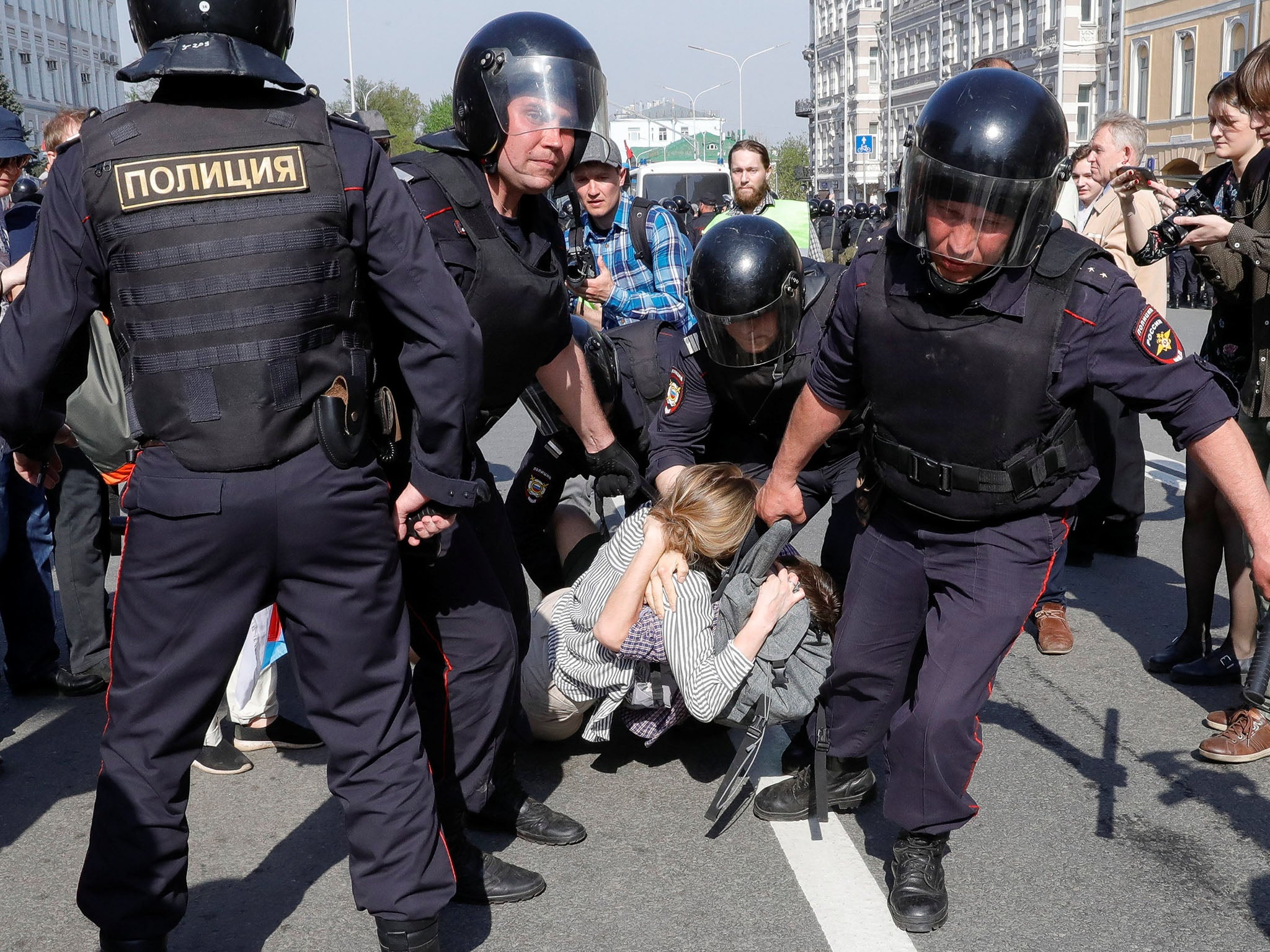Key Putin opponent Alexei Navalny among hundreds arrested in violent clashes with Russian police
The Independent witnesses special forces stream into crowd, batons flying
Your support helps us to tell the story
From reproductive rights to climate change to Big Tech, The Independent is on the ground when the story is developing. Whether it's investigating the financials of Elon Musk's pro-Trump PAC or producing our latest documentary, 'The A Word', which shines a light on the American women fighting for reproductive rights, we know how important it is to parse out the facts from the messaging.
At such a critical moment in US history, we need reporters on the ground. Your donation allows us to keep sending journalists to speak to both sides of the story.
The Independent is trusted by Americans across the entire political spectrum. And unlike many other quality news outlets, we choose not to lock Americans out of our reporting and analysis with paywalls. We believe quality journalism should be available to everyone, paid for by those who can afford it.
Your support makes all the difference.Hundreds of anti-Putin demonstrators were arrested as police clamped down on a nationwide protest organised by Kremlin critic Alexei Navalny. Taking place on the eve of the president’s 7 May inauguration, and six weeks before the start of the World Cup, the demonstrations began in Vladivostok in Russia’s far east, before sweeping westward. But it was in Moscow where the real drama took place.
Mr Navalny, who arrived on the scene of the unsanctioned protest on Pushkin Square at 2.25pm, was arrested just five minutes later. Visibly tense, in a blue and white checked shirt, he told supporters to join him in chanting “down with the tsar”. This they did – just about drowning out the police warning of impending physical force and impact munitions.
That the afternoon’s affair would not be the more usual, cautious game of cat-and-mouse was clear before the protest, with a large number of Cossack soldiers and “voluntary” pro-Kremlin militia seen heading to the square just after noon. The Independent witnessed how they mingled with organisers carrying iPads, and, on one occasion, saw money being exchanged.
An hour before the advertised start of the protest, approximately 300 people had occupied the Pushkin memorial on the edge of the square. They wore St George’s ribbons, a symbol of state-sponsored patriotism, and began to aggressively interact with the pro-Navalny supporters. They removed banners from the crowd, and introduced a level of confusion into the situation that, for a while, threw the protesters off guard.
Shortly after Mr Navalny’s arrest, the mass detentions began. With low-flying police helicopters guiding them, Russian “cosmonauts”, as special forces are nicknamed, streamed into the crowd, batons flying. They peeled off protestors – some resisting, all with whitened faces – delivering them to police vans waiting on the boulevard that runs alongside the square.
One of the men who resisted managed to escape back into the crowd. Barely a minute later, he was returned, with extreme force, dragged along the ground to the police buses. Over the loudspeaker, police reminded protesters that their faces had been recorded, and the time had come to leave.
A standoff between police and protesters ensued. Bricks were thrown, arrests were made and at least one protester was hospitalised.
Despite the violence, a smaller group stayed to protest, and some staged a sit-in protest on the boulevard. They continued to chant Navalny’s trademark slogans – “Putin is a thief,” “Russia without Putin,” “Shame” and “Down with the tsar”.

By 5pm, police had closed off most of the square, and pushed protesters to the neighbouring roads and streets.
Today’s events were similar in style to protests witnessed before the last Putin inauguration in May 2012. Then, violent clashes were accompanied by mass arrests and, later, draconian prison sentences. That moment put a definitive cross on Russia’s nascent protest movement.
The Kremlin’s grip on power has increased steadily since then – and the level of its ascendancy demonstrated by the catastrophic showing of liberal forces in March’s presidential elections.
“The authorities think of themselves as strong, with strong social support,” says the independent expert Dmitry Oreshkin. “That might not be true, but they were clearly tempted to clamp down harshly to break Navalny.”
Mr Navalny, who was controversially not allowed to participate in those elections, still represents the most organised and powerful force in the opposition. His YouTube-friendly style, energy and irreverent anti-corruption investigations have enthused Russia’s youth. And today, it was mostly Russia’s younger generations who turned out.
But the opposition leader’s absolutist tactics have lost him some support among moderates. Many criticised his refusal to agree to an alternative out-of-centre protest venue on Sakharov Avenue, suggesting he had been angling for a scandal.
“The older generation are leaving him because they see he is no longer a protest leader, but a revolutionary,” says Mr Oreshkin. “He has the young people, who are easier to manipulate, but he frightens people. He doesn’t seem to have anything new to offer apart from mass rallies.”

According to the OVD-Info non-governmental police watchdog, over 1000 arrests were made across the country, the lion’s share of them in Moscow.
But Vladimir Ashurkov, a key member of Navalny’s inner circle, insisted that the nationwide protests were a success.
“There was a lot of discussion in our group whether people would turn out in the middle of Russia’s holiday season, but they did,” he said. “We are building real capacities now – regional volunteer networks, social media, investigations and election campaigns.”
The Navalny ally likened the protests to fitness training.
“We aren’t yet at the point of Armenia, when protests can change the political environment,” he says. “But there will come a time when the balance will change, and we’ll need to have our muscles well trained for that moment.”

Join our commenting forum
Join thought-provoking conversations, follow other Independent readers and see their replies
Comments